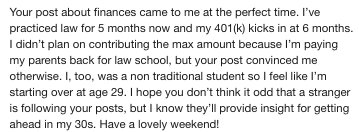I planned on writing something else today, but then I got this message:

I had a post on LinkedIn that went viral, a week later it has 2200+ reactions and 190,000 views. I had noticed that personal finance and investing are evergreen topics for which there is no satiation. People always want to understand what others do with their money. So I thought I’d share what I’ve done with my money and how it’s serving me.
There’s a character limit for a LinkedIn post. So there’s only so much context you can add to a post. The post was quite the Rorschach test to see what context people wanted to supply. One response proposed to ignore me (clearly that didn’t work) because I grew up rich. I never wanted for food, but suffice to say it was very much the opposite. Some only saw the bragging from an anomalous winner.
Others saw someone being vulnerable about their own finances – it’s not exactly a brag to have not made $40,000 until you’re 31. And these people also saw the potential for control of their own finances. These are the people that excited me.
People DM’d me for tips which I was happy to share. I said to myself, if even 1/10 of 1% of the people that viewed this post did something to take more control over their finances, that’s 190 people whose lives I improved. The internet is nothing short of a marvel, and it’s easy to underestimate it.
It was great to get support from so many friends and connections. And to make new connections and conversations with people interested in making their success. Posting like this is a social good, and there are so many indirect benefits that are underestimated for the same reasons the internet is underestimated.
The post clearly resonated with many. Now I understand the corollary of resonance: if you’re saying something some people love, you’re saying something others hate. We’re so used to milquetoast social conventions. Saying hi to people you don’t know on the street, telling call center staff that you’re doing fine.
Manners are a middle-class conceit, to train us into docility and malleability. The rich and the poor express themselves, and they know the variance in responses they can expect. For more on this, see Skin in the Game by Taleb.
I cross-posted the LinkedIn post on reddit the same day and they tore it to pieces. One poor soul said “it’s annoying enough that I blocked you on LinkedIn and yet still see your posts from my friends liking them.” Putting aside the devastating self-own (your friends all like me?), posts like this made me realize I can choose which responses to focus on. If I had only focused on the reddit post, I might have given up. But if you really believe in your voice, if you are really helping people, and if you’re consistent, the right people will find you and support you. I’m writing to get messages like the one above.